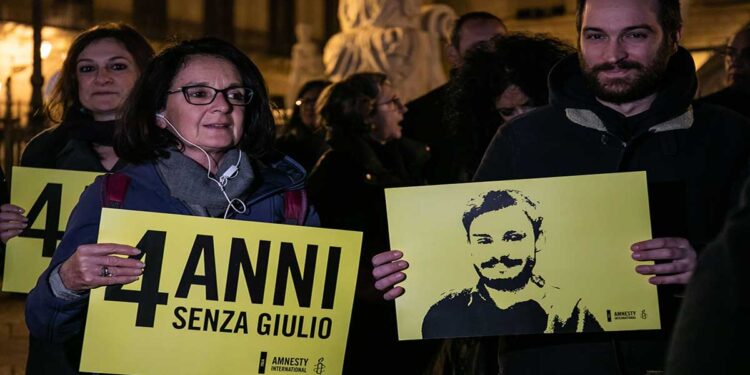The statement of the Egyptian Prosecutor on Regeni is pathetic and without basis
The Egyptian prosecutor’s reasons to suspend the Regeni case are ridiculous
The Egyptian government committed terrible crimes to cover up Regeni’s murder
Arab Organisation for Human Rights in UK (AOHR UK) said that the Egyptian decision to suspend the murder case of the Italian Giulio Regeni, as well as the prosecution’s statements on the findings of the investigations are both ridiculous and unfounded. Such acts obscure the clear facts and allow for the perpetrators’ impunity. The organisation stressed that the prosecutors statements are in line with the Egyptian regime’s context regarding all cases of gross human rights violations.
The statement issued by the Egyptian Public Prosecution on December 01, is superficial, lacks logic and is full of contradictions. The judicial authorities claimed that it decided to suspend the case after being unable to determine the real perpetrator, after nearly five years of research and investigation. However, in the same statement, the judicial authority claims it confirmed arresting and charging indivuduals from a known gang, a month after the crime occurred, after being caught red handed with Regeni’s personal belongings including his bag which contained his ID.
Ironically, after a period of cracking down on the alleged gang, for being ‘specialist in impersonating officers and robbing foreigners’, the prosecution denied the gang’s responsibility for the murder of Regeni. This came after the Italian authorities protested the results. However, they linked them once again to the crime in the latest statement, after the Italian authorities confirmed that the killers were five people from the Egyptian security authorities rather than the gang members.
AOHR UK confirmed that the Public Prosecution’s statement is nothing but a cover up for the perpetrators, given that the judicial system is only a tool in the hands of the Egyptian regime used to clear its image, cover up its crimes and provide immunity to the perpetrators, while being used to abuse political opponents, confiscate their money and issue harsh sentences against them, including the death penalty.
The statement from the Public Prosecutor is not unanticipated, as it attempted to cover up the main perpetrators in this heinous crime. The prosecutor completely ruled out the possibility that security individual could be charged while continuing to place blame on innocent citizens.
The Italian student and researcher, Giulio Regeni, was found dead on February 03, 2016 on a side road in Cairo, after disappearing since January 25, 2016. According to eyewitness from the neighbors, security personnel dressed in civilian clothes arrested Regeni, near his residence area in Dokki, moments before his forced disappearance.
AOHR UK pointed out that Giulio’s autopsy results were similar to a number of torture victims inside the Egyptian security detention facilities. The results showed that his fingernails and feet were plucked out in a brutal manner, traces of electrocution were found in all parts of his body, internal bleeding in the skull confirming that it was fractured, fractures in the spinal column of the neck as a result of twisting it, multiple fractures in his body, and beatings with sharp tools in his head and groin. The forensic doctor who was assigned the autopsy stated before the Public Prosecution on March 01, 2016 that the autopsy he performed showed that Regeni was interrogated over a period of up to seven days before he was killed.
The killing under torture of the Italian student is heinous crime added to the bloody record of the Egyptian regime. The number of deaths under torture in the Egyptian detention and investigation centers at the hands of the security services during the era of Sisi exceeded 100 people out of 864 people who died under different reasons, most notably medical negligence.
The Italian authorities handling of this crime is weak and inadequate, as they did not take any serious or meaningful measures to hold Regeni’s murderers accountable. Instead, it returned the Italian ambassador to Cairo a year and a half after he was summoned, without making any progress in the investigations. The Italian authorities also did not justify reasons for not disclosing names of the five Egyptian officers whose involvement in the death of Regeni was confirmed by the Italian investigations. Such action confirms that the authorities are not serious in finding justice for the Italian citizen.
In June 2020, an arms deal with Egypt worth 11 billion euros was announced by the Italian government, raising questions on Italy prioritising trade over the lives of its citizens. This also is a flagrant violation of the pledge of August 2013 signed by Member States of the European Union who agreed to ‘suspend all export licensing to Egypt for equipment which might be used for internal repression.’ as well as to ‘review economic and security assistance to Egypt.’.
AOHR UK calls on the Italian government to review its relationship with Egypt and to take the necessary measures with the EU to pressure the Egyptian authorities to uncover the brutal details of Regeni’s murder and hold those responsible accountable.
AOHR UK calls on the international community to review its security relations with the Egyptian regime, given the grave violations of human rights committed by its apparatus, highlighting that cooperation with this regime is a direct support for all its brutal crimes.


























